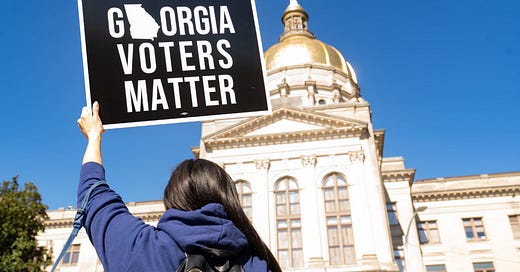Happy Easter. Fifty-three years ago today, Martin Luther King Jr. gave his final speech to striking sanitation workers in Memphis.
Well, I don't know what will happen now. We've got some difficult days ahead. But it doesn't matter with me now. Because I've been to the mountaintop. And I don't mind. Like anybody, I would like to live a long life. Longevity has its place. But I'm not concerned about that now. I just want to do God's will. And He's allowed me to go up to the mountain. And I've looked over. And I've seen the promised land. I may not get there with you. But I want you to know tonight, that we, as a people, will get to the promised land. And I'm happy, tonight. I'm not worried about anything. I'm not fearing any man. Mine eyes have seen the glory of the coming of the Lord.
1. Suppression Ain’t Peachy
I got some pushback over a tweet I sent summarizing the state of affairs surrounding the Georgia election bill this way.

While my tweets are overwhelmingly unimpeachable hot fire, I can recognize they aren’t all gonna be 100, so I don’t mind taking a little heat back when they aren’t. But on the Georgia matter in particular there are a few intersecting issues at play and they are all consequential to our political and cultural life in 2021, so I want to revise and extend my remarks a bit.
For starters I have no intention of creating an “equivalency” between the two parties’ mistruths or actions when it comes to the democratic threats before us. It would be preposterous to suggest there was an equivalence, and anything I wrote that left people with that impression should’ve been worded more precisely.
I am *very* clear-eyed about the Republicans’ racist voter-suppression efforts, as are other folks here at The Bulwark. To contextualize what is happening with the GOP, let’s take a look at their actions in Georgia and elsewhere from the 30,000-foot level:
The GOP’s “election integrity” offensive is premised entirely on the same “Big Lie” that led to the sacking of the Capitol and the deadly assault on the Capitol Police. This false premise invalidates all these efforts from the jump.
No Republican elected officials have undermined this premise by providing concrete evidence there was meaningful voter fraud in the 2020 election and that new laws are needed to address what happened.
It is undoubtedly true that Republicans have decided that for their political program to succeed they need to gain power through minority support with a combination of efforts that are at varying times legal, extralegal, or norm-busting.
I wrote about the Republicans’ “tyranny of the minority” here.
Jonathan Chait did an excellent job detailing how the GOP’s “lawful minority rule” wing and “lawless authoritarian” wing have united behind these voter-suppression bills.
Jane Mayer’s New Yorker report demonstrates how the McConnell/Koch axis is deeply concerned about voter support for some of the genuine election reforms included in H.R. 1 and how that support threatens the GOP.
Republican campaigns are fighting among themselves over who can be the most ostentatious in advancing the falsehood that Democrats stole the election, and even the more “mainstream” candidates’ platforms include voting-rights restrictions, as I’ve documented.
Republicans are specifically targeting black communities in their voter-suppression efforts in a manner that would be unconscionable in any circumstance but is particularly indefensible given this country’s history from slavery to Jim Crow to Give Us the Ballot.
So in conclusion the Republicans’ so-called “election integrity” efforts are inherently racist, based on a deadly lie, and completely unnecessary as a prudential matter.
Other than that, Mrs. Lincoln . . .
Given how debased the Republicans’ gambit is across every conceivable metric you would think there would be no need for opponents to gild the lily.
Welp.
2. But He Fights!
For some reason a lot of Democrats from Biden all the way down have tried to turn the Georgia law itself into something it isn’t—giving Karl Rove the opportunity to attack them with some basis in truth, which I deeply resent.
The Georgia bill as written has some disgusting parts (no handing out food and water at the polls, except by poll-workers) and some concerning parts (giving state-level bureaucrats the authority to usurp county election boards) but it isn’t Jim Crow on Steroids in any meaningful sense of that phrase. The polls aren’t being closed at 5 p.m. And many of the most noxious proposals from the dregs of the bigoted Georgia GOP (such as banning early voting on Sundays) were removed from the final bill.
After this bill, Georgia will still have 17 days of early voting. That gives folks a lot of opportunities to get to the polls! Both the early and absentee ballot rules are still more expansive than in many blue states. Yes the bill was ill-intentioned, but the end result doesn’t seem to be likely to yield a result that matches those intentions.
There is evidence that some recent voter-suppression efforts have backfired and resulted in increased turnout. Nate Cohn details how the Georgia law is unlikely to negatively affect turnout and might plausibly increase it.
So given all that, is a little hyperbolic flapdoodle in service of stopping a phony, bigoted power-grab that big of a deal?
My answer to that is . . . kind of, yes??
I don’t think it would bother me that much if the exaggerations and alarm-ringing were coming from a voting-rights advocacy group, for example. It’s their job to draw attention to things like this.
But coming from the White House, after all the gaslighting we’ve been through the last half decade? I think we should probably ask for a critique that is a little more in touch with reality.
The defense of these exaggerations comes in a lot of different forms but basically it down to: “But We Fight! the evil opposition.” And, well, I guess I’m a little triggered by those types of rationalizations exempting people from being tethered to critique.
I’m also not at all convinced that it is strategically effective. On the one hand, turning the outrage meter from 9 to 11 might motivate more people to turn out in future elections, yes. But doesn’t that also undermine the merits of the argument?
Isn’t it also plausible that Atlanta losing the All-Star Game and Republican indignance over the overheated charges turn off some of the new voters in Georgia whom Democrats have recently won over? Some Georgia Republicans think so.
Is there also a risk to keeping the outrage meter at 11, as it might cause people to tune out to more warranted 11-level outrages from revanchist Republicans determined to use every anti-Democratic lever imaginable to gain power? Might an already piqued electorate become even more radicalized in ways that are unhealthy to our body politic?
These questions aren’t really answerable. And anyone who claims to be certain that they know which strategy will yield the best result in the end is selling you a bill of goods. Everyone is just making a judgment call based on the information they have and their view of the merits of the case.
For me, given the nature of the threat from the anti-democratic GOP, the best path forward is to stick to the strong, truthful case that can be made against the bill based on the GOP’s ill intent, rather than trying to make the actual legislation something it’s not.
3. Culture War Eats Everything
The GOP as a party that cared about free-market economics or business-friendly policies has been dead and buried for a while now, but the extent to which the culture war is dancing on its grave in Georgia this week is really something.
Here’s Chip “Be a Goldfish” Roy and Rep. Jeff Duncan proposing removing the MLB’s antitrust exemption in retaliation for the decision to move the All-Star game over the Georgia bill.


And here is the Georgia state legislature trying to cancel a Delta tax break at the last minute over that company’s opposition to the bill.


Or as Andrew Breitbart might say: Economic policy is downstream from lib-owning politics, which is downstream from culture.





